Ditapis dengan
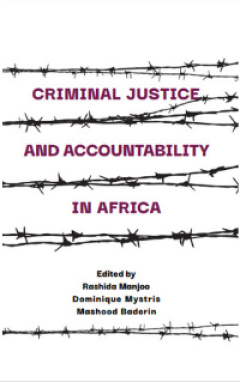
Criminal Justice and Accountability in Africa: Regional and National Developm…
Historically Africa has suffered from numerous conflicts which are typically addressed through international criminal law mechanisms and courts, but the need for a broader approach is both evident and demanded. This book pulls together the debates originating from the conference “Criminal Justice and Accountability in Africa: National and Regional Developments” and highlights the different …
- Edisi
- -
- ISBN/ISSN
- 978-1-991213-18-1
- Deskripsi Fisik
- 224 hlm.
- Judul Seri
- -
- No. Panggil
- -
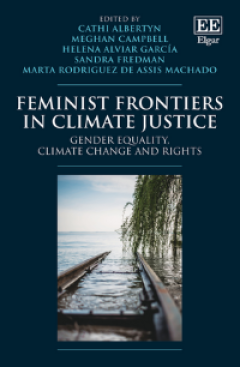
Feminist Frontiers in Climate Justice: Gender Equality, Climate Change and Ri…
Feminist Frontiers in Climate Justice provides a compelling demonstration of the deeply gendered and unequal effects of the climate emergency, alongside the urgent need for a feminist perspective to expose and address these structural political, social and economic inequalities. Taking a nuanced, multidisciplinary approach, this book explores new ways of thinking about how climate change intera…
- Edisi
- -
- ISBN/ISSN
- 978-1-80392-379-6
- Deskripsi Fisik
- 318 hlm.
- Judul Seri
- -
- No. Panggil
- -
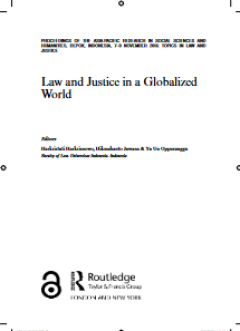
Law and Justice in a Globalized World: Proceedings of the Asia-Pacific Resear…
The book consists of a selection of papers presented at the Asia-Pacific Research Conference on Social Sciences and Humanities. It contains essays on current legal issues in law and justice, and their role and transformation in a globalizing world. Topics covered include human rights, criminal law, law of the sea, good governance, democracy, foreign investment, and regional integration. The con…
- Edisi
- -
- ISBN/ISSN
- 978-1-315-22329-2
- Deskripsi Fisik
- 284 hlm.
- Judul Seri
- -
- No. Panggil
- -

The Future of the Law of the Sea: Bridging Gaps Between National, Individual …
It explores the diverse phenomena which are challenging the international law of the sea today, using the unique perspective of a simultaneous analysis of the national, individual and common interests at stake. This perspective, which all the contributors bear in mind when treating their own topic, also constitutes a useful element in the effort to bring today’s legal complexity and fragmenta…
- Edisi
- -
- ISBN/ISSN
- 978-3-319-51274-7
- Deskripsi Fisik
- 278 hlm.
- Judul Seri
- -
- No. Panggil
- -
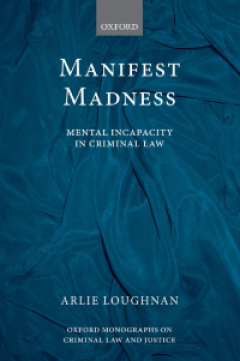
Manifest Madness: Mental Incapacity in the Criminal Law
Whether it is a question of the age below which a child cannot be held liable for their actions, or the attribution of responsibility to defendants with mental illnesses, mental incapacity is a central concern for legal actors, policy makers, and legislators when it comes to crime and justice. Understanding the terrain of mental incapacity in criminal law is notoriously difficult; it involves t…
- Edisi
- -
- ISBN/ISSN
- 978-0-19-969859-2
- Deskripsi Fisik
- 307 hlm.
- Judul Seri
- -
- No. Panggil
- -

Contested Justice: The Politics and Practice of International Criminal Court …
The International Criminal Court emerged in the early twenty-first century as an ambitious and permanent institution with a mandate to address mass atrocity crimes such as genocide and crimes against humanity. Although designed to exercise jurisdiction only in instances where states do not pursue these crimes themselves (and are unwilling or unable to do so), the Court's interventions, particul…
- Edisi
- -
- ISBN/ISSN
- 978-1-139-92452-8
- Deskripsi Fisik
- 526 hlm.
- Judul Seri
- -
- No. Panggil
- -
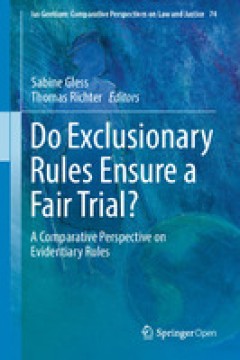
Do Exclusionary Rules Ensure a Fair Trial?: A Comparative Perspective on Evid…
This book discusses exclusionary rules in different criminal justice systems. It is based on the findings of a research project in comparative law with a focus on the question of whether or not a fair trial can be secured through evidence exclusion. Part I explains the legal framework in which exclusionary rules function in six legal systems: Germany, Switzerland, People’s Republic of China, …
- Edisi
- -
- ISBN/ISSN
- 978-3-030-12520-2
- Deskripsi Fisik
- 387 hlm.
- Judul Seri
- -
- No. Panggil
- -
 Karya Umum
Karya Umum  Filsafat
Filsafat  Agama
Agama  Ilmu-ilmu Sosial
Ilmu-ilmu Sosial  Bahasa
Bahasa  Ilmu-ilmu Murni
Ilmu-ilmu Murni  Ilmu-ilmu Terapan
Ilmu-ilmu Terapan  Kesenian, Hiburan, dan Olahraga
Kesenian, Hiburan, dan Olahraga  Kesusastraan
Kesusastraan  Geografi dan Sejarah
Geografi dan Sejarah